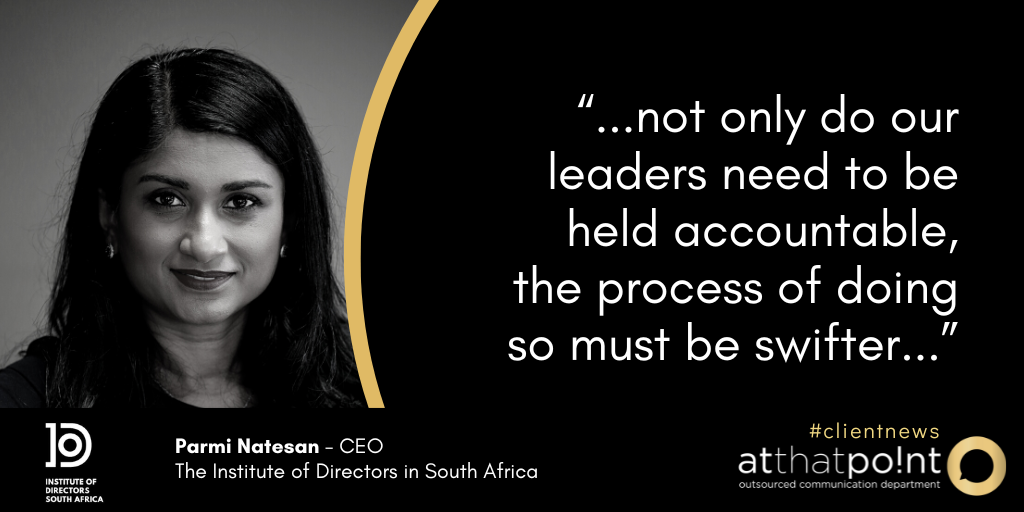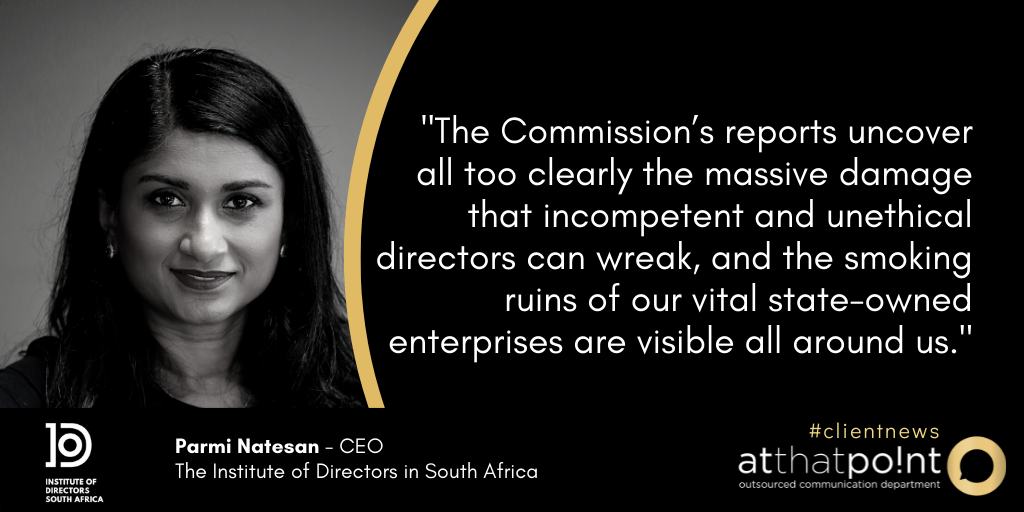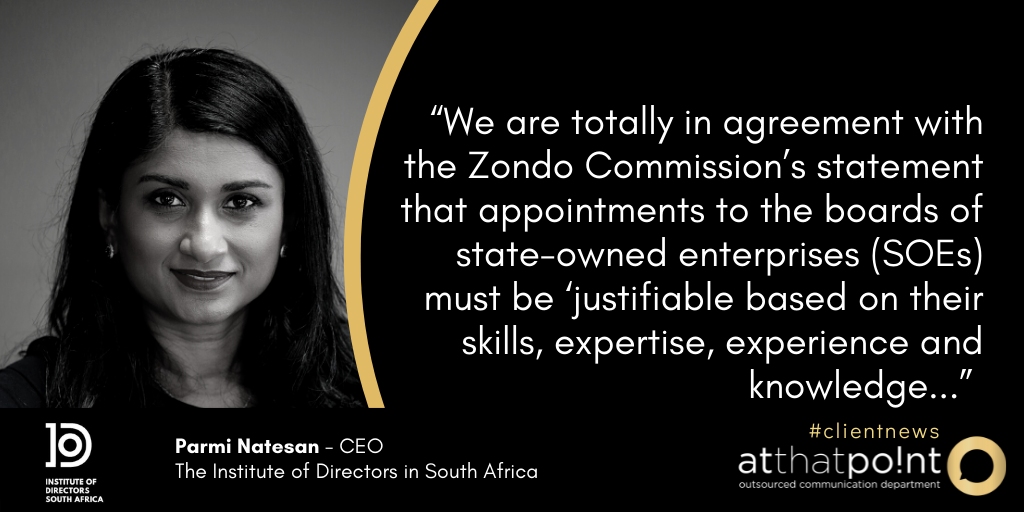 In its final report, the Zondo Commission repeatedly comments that directors of the various captured state entities have not been properly held accountable for the massive damage they have caused to the organisations they were supposed to serve, and thus indirectly to the country as a whole. The Institute of Directors in South Africa (IoDSA) strongly endorses these observations. “The issue of director accountability is one that the IoDSA has been raising in public forums for a number of years. In a letter to the Commission in September 2021, we specifically raised the point that not only do our leaders need to be held accountable, the process of doing so must be swifter,” says Parmi Natesan, CEO, IoDSA. “We recommended the establishment of a constitutional means of alternate dispute resolution to facilitate prompt and effective consequence management both for transgressing directors and those charged with exercising oversight over them.” In its final report, the Zondo Commission maintains that legal processes typically only manage to identify “egregious abuses of public power” when the perpetrators or those that protect them are out of power. The Report also makes the point that the delayed legal process is a “cumbersome, time consuming [sic] exercise”. It therefore recommends that the Companies Act’s 24-month time bar relating to delinquency directors should be extended. This would allow prosecution of, amongst others, the 2014 board of Eskom and two erring South African Airways directors.[1] One of those two directors, Dudu Myeni, the former chair of South African Airways, was declared a delinquent director in 2020 but, says Ms Natesan, only after an extremely time- and resource-intensive process. As a result, director accountability remains rare. The Report then makes a more sweeping recommendation that Government “give consideration to the creation of a statutory offence rendering it a criminal offence for any person vested with public power to abuse public power vested in that person by intentionally using that power otherwise than in good faith for a proper purpose” [emphasis in original].[2] “The IoDSA certainly supports the idea that the 24-month time bar should be extended to allow for holding the numerous defaulting directors identified in the Report to be investigated and prosecuted if necessary. Furthermore, we strongly believe that a more streamlined and rapid process needs to be found,” Ms Natesan says. “An excellent short cut would be to mandate that all directors have to belong to the professional body for directors, so that they could be disciplined under a Code of Conduct and barred from serving as directors if they are found to be in breach of their duties, without the long delays inherent in the legal process. “The benefit would be that the transgressing director would not remain in office while the legal process takes its course—something that would surely have contained the damage caused to SOEs like Eskom and SAA.” ENDS MEDIA CONTACT: Stephné du Toit, [email protected], 084 587 9933, www.atthatpoint.co.za For more information on the IoDSA please visit: Website: www.iodsa.co.za Twitter: @The_IoDSA LinkedIn: Institute of Directors in South Africa Company Page Facebook: Institute of Directors South Africa [1] Judicial Commission of Inquiry into Allegations of Capture, Corruption and Fraud in the Public Sector Including Organs of State, Report: Part VI, Volume 4: Summary of Recommendations 37 (p 95), 12 -3(p 3) and 119 (p 43), available at www.statecapture.org.za/site/files/announcements/672/OCR_version_-_State_Capture_Commission_Report_Part_VI_Vol_IV_-_Recommendations.pdf. [2] Ibid 119 (p 43), 122-6 (p44).
0 Comments
 In its final report, the Judicial Commission of Inquiry into State Capture (Zondo Commission) recommends the enactment of legislation to establish a professional body for public procurement officials.[1] While there is no doubt this is a good move, the Institute of Directors in South Africa wishes to express its disappointment that its recommendation for a similar enforced body for directors was not acted on. “We wrote to the Commission in September 2021 setting out the compelling reasons to recommend the establishment of a statutory professional body for directors. By not doing so, we believe that the Commission missed a historic opportunity to alter fundamentally the governance landscape of the country for the better,” says Parmi Natesan, CEO: IoDSA. “The Commission’s reports uncover all too clearly the massive damage that incompetent and unethical directors can wreak, and the smoking ruins of our vital state-owned enterprises are visible all around us.” A mandatory professional body for directors would have the benefit of requiring that directors would have to keep their skills updated via a rigorous process of continuous professional development. The professional body would also be able to keep its members abreast of developments in governance best practice. Equally important, members of such a professional body would be bound by a code of conduct, in terms of which they could be rapidly disciplined and even have their membership terminated. Termination could in turn signal to the market to not appoint them as a director. “As we now contemplate the possibility of years of litigation to bring the main actors in state capture to book, establishing a mechanism through which unethical or incompetent directors could be swiftly and relatively inexpensively held to account looks very attractive,” she observes. The IoDSA further argues that alongside a statutory professional body for directors, there should be enforcement of formal director designations registered with the South African Qualifications Authority (SAQA). Such formal designations would provide a way to ensure that directors have the necessary competencies to serve as a director based on rigorous testing against a formal competency framework. Designation holders who fail to keep their skills updated in line with the CPD framework would have their designations removed, reducing their attractiveness to companies. The IoDSA already owns and awards two SAQA-recognised director designations—Certified Director (SA) and Chartered Director (SA). “Directorship is now a serious profession that requires individuals to possess a definite set of skills and competencies, and the ability to provide strong leadership based on sound ethical principles,” Ms Natesan concludes. “While this was not covered in the Commission’s final recommendations, the IoDSA will continue to lobby for directorship to become a regulated profession, providing both the public and private sectors with a growing pool of properly qualified individuals who have committed to ethical leadership and have signed on to a solid code of conduct.” ENDS MEDIA CONTACT: Stephné du Toit, [email protected], 084 587 9933, www.atthatpoint.co.za For more information on the IoDSA please visit: Website: www.iodsa.co.za Twitter: @The_IoDSA LinkedIn: Institute of Directors in South Africa Company Page Facebook: Institute of Directors South Africa [1] Judicial Commission of Inquiry into Allegations of Capture, Corruption and Fraud in the Public Sector Including Organs of State, Report: Part VI, Volume 4: Summary of Recommendations, 62, p24, available at www.statecapture.org.za/site/files/announcements/672/OCR_version_-_State_Capture_Commission_Report_Part_VI_Vol_IV_-_Recommendations.pdf.  The Institute of Directors in South Africa (IoDSA) broadly welcomes the recommendation to establish a Standing Appointment and Oversight Committee to strengthen the process of nominating and appointing directors of state-owned enterprises. The recommendation was made in the final volume of the report of the Judicial Commission of Inquiry into State Capture (Zondo Commission).[1] “We are totally in agreement with the Zondo Commission’s statement that appointments to the boards of state-owned enterprises (SOEs) must be ‘justifiable based on their skills, expertise, experience and knowledge’[2], and that the state, through the responsible ministers, has signally failed to appoint the ‘right kind of people’[3] to the boards of SOEs,” says Parmi Natesan, CEO, IoDSA. “This is an issue that the IoDSA has repeatedly raised, and which is covered in King IV. The notion that board members should be appointed based on the needs of the organisation is revolutionary in the South African context, where political appointments have effectively collapsed the public sector.” Principle 7 of King IV states that: The governing body should comprise the appropriate balance of knowledge, skills, experience, diversity and independence for it to discharge its governance role and responsibilities objectively and effectively. This goal is particularly hard to attain for SOEs because the state, as the sole shareholder, has the power to make appointments unilaterally. In the sector supplement for SOEs, King IV advises SOEs and executive authority to collaborate in the nomination process and to make it transparent. King IV requires the nomination of any board candidate to take into account the needs of the governing body in terms of skills, knowledge and experience, the governing body’s diversity, and whether the candidate meets the “appropriate fit and proper criteria”.[4] Ms Natesan argues that these criteria should include the IoDSA’s Director Competency Framework.[5] Given the reality that the state has power that shareholders in the private sector do not, the Zondo Commission’s recommendation that a committee be set up to govern the process of nominating and electing SOE board members is a good one. In fact, in a letter to the Commission in September 2021, the IoDSA recommended the establishment of a consistent and transparent nominations process that included a nominating panel comprising representatives of appropriate stakeholder interests. “The Commission’s recommendation is actually much stronger because it seemingly envisages that the proposed committee would have the power to control the nomination process even against the wishes of the executive in order to secure the future of the SOE,” Ms Natesan says. “Our only disappointment is that the list of persons to serve on the oversight committee does not include a representative of the IoDSA, preferably somebody who holds one of our SAQA-registered directorship designations and who would be in a position to provide expert input on the directorship role and the competencies required.” ENDS [1] Judicial Commission of Inquiry into Allegations of Capture, Corruption and Fraud in the Public Sector Including Organs of State, Report: Part VI, Volume 4: Summary of Recommendations 247, p 181, available at www.statecapture.org.za/site/files/announcements/672/OCR_version_-_State_Capture_Commission_Report_Part_VI_Vol_IV_-_Recommendations.pdf. [2] Ibid 6, p 2. [3] Ibid 112, p 41. [4] IoDSA, Report on Corporate Governance for South Africa 2016, p 15, available at https://www.iodsa.co.za/page/king-iv. [5] Available at www.iodsa.co.za/resource/collection/56E77A6D-56E7-46EF-86EF-B425DD00EA9B/Director_Competency_Framework.pdf. MEDIA CONTACT: Stephné du Toit, [email protected], 084 587 9933, www.atthatpoint.co.za For more information on the IoDSA please visit: Website: www.iodsa.co.za Twitter: @The_IoDSA LinkedIn: Institute of Directors in South Africa Company Page Facebook: Institute of Directors South Africa |
Archives
July 2024
Categories
All
|

 RSS Feed
RSS Feed